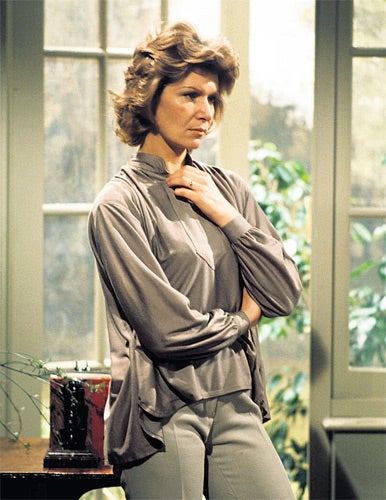Sheila Allen: Actress who made her mark on the stage before starring in 'Bouquet of Barbed Wire'

Sheila Allen, a triumphant English actress possessed of strong looks, deep voice and a graceful, maternal manner, had, outside the theatre, only one true moment in the spotlight – as the seemingly steadfast suburban housewife Cassie Manson in one of the great television events of its age, Andrea Newman's magnificent Bouquet of Barbed Wire (1976). Cunningly cast for her theatrical repose, Allen was the foil for millions of viewers who were drawn into the story of the detonation of a nuclear family through the exploration of sexual taboos. Only halfway through the serial, in the extraordinary episode "Repercussions", a remarkable musing on sexual masochism, did we learn the whole truth about Cassie – and Allen brilliantly managed to reveal the uncomfortable details of her character's past without once losing our sympathy or understanding. It was a perfect showcase for her skill in expressing decency and intelligence, a skill that blessed many of her finest stage performances.
Born in Somerset in 1932, Allen was schooled in Clwyd and at 17 won a place at Rada. A gruelling period in repertory followed, which whisked her from Pitlochry to the Bristol Old Vic, but which also saw swift appreciation of her talents, particularly in classical roles. Arriving in London in the early Sixties, her marbled maternal goddess looks and gentle, eloquent command were out of fashion with much of the new writing of the era, but there were plenty of other outlets for her talent, and even the occasional new play, such as James Brabazon's psychiatry thriller The Last Ally at the Lyric, Hammersmith, for which she won excellent notices.
But it was at the RSC that she truly became one of the great stage actresses of the age, even if she never quite shared the celebrity of Glenda Jackson and Janet Suzman. She joined the company in 1964 at the Aldwych, and over the next 15 years her successes included Lady Percy in Henry IV Parts 1 & 2 (1966), one of a particularly devastating triumvirate of wicked sisters in Trevor Nunn's King Lear at Stratford-upon-Avon (1968) alongside the equally powerful Susan Fleetwood and Diane Fletcher, and Sofia in Gorky's The Zykovs (1976), directed by her husband, David Jones. She even did her best in an ill-conceived Macbeth starring a miscast Tom Baker in 1973 at the Shaw Theatre, although her inherent goodness was always wiser exploited than suppressed.
Her annus mirabilis was 1977, when, in the aftermath of the furiously controversial Bouquet of Barbed Wire, she gave what many considered the performance of her career in Pam Gems's Queen Christina at The Other Place, as well as a marvellous turn in Newman's even more fascinating sequel to Bouquet of Barbed Wire, entitled Another Bouquet. She had previously appeared in a small role in Peter Hall's underrated film of Newman's novel Three Into Two Won't Go (1969), adapted for the screen by Edna O'Brien, and probably captured Newman's crucial fusion of feminist ideals and suburban compromise better than any other actress has since.
Although never a television star, she blessed the small screen many times, particularly in the Seventies. She was perfectly in control as a returning barrister in the always probing Crown Court (1972-84), and splendidly cast as the suffragette Emmeline Pethick-Lawrence in Shoulder to Shoulder for the BBC in 1974. She graced two eminent Play for Todays, David Mercer's tortured The Bankrupt (1972) and one of David Halliwell's fiendish early experiments in multi-viewpoint drama, Triple Exposure, the same year. She lent a formidable air to Anglia's successful P D James adaptation Shroud for a Nightingale (1984), and was a welcome addition to the enjoyably bonkers The Prisoner (1967), appearing in one of the best episodes, Anthony Skene's "A, B & C". Best of all was her unimaginably fine Jocasta in Alan Bridges' Play of the Month presentation of King Oedipus (1972) for the BBC.
Her film work was sporadic, but pleasingly, she ended her career with a part in Harry Potter and the Goblet of Fire (2005). Little do those little faces watching her witchery realise the magic this beautiful actress conjured up for so long without the use of sorcery, but simply with her presence and majesty.
Sheila Allen, actress: born Chard, Somerset 22 October 1932; married 1964 David Jones (died 2008, two sons); died London 13 October 2011.
Subscribe to Independent Premium to bookmark this article
Want to bookmark your favourite articles and stories to read or reference later? Start your Independent Premium subscription today.

Join our commenting forum
Join thought-provoking conversations, follow other Independent readers and see their replies